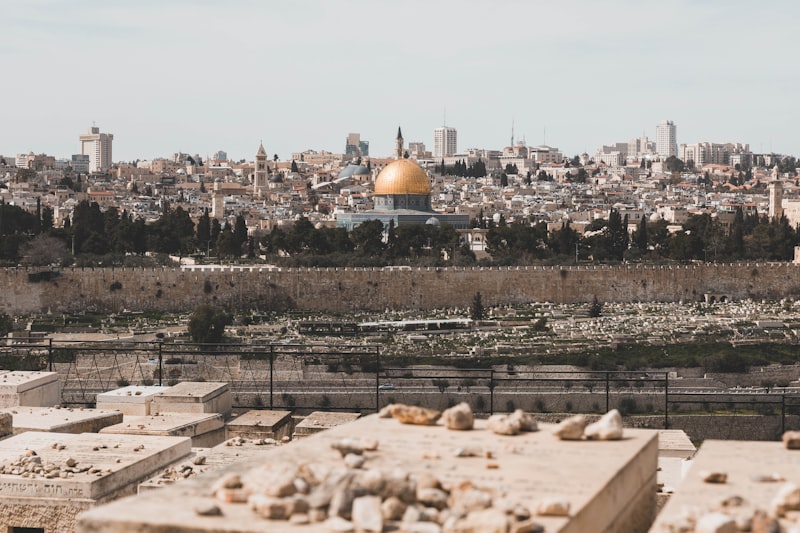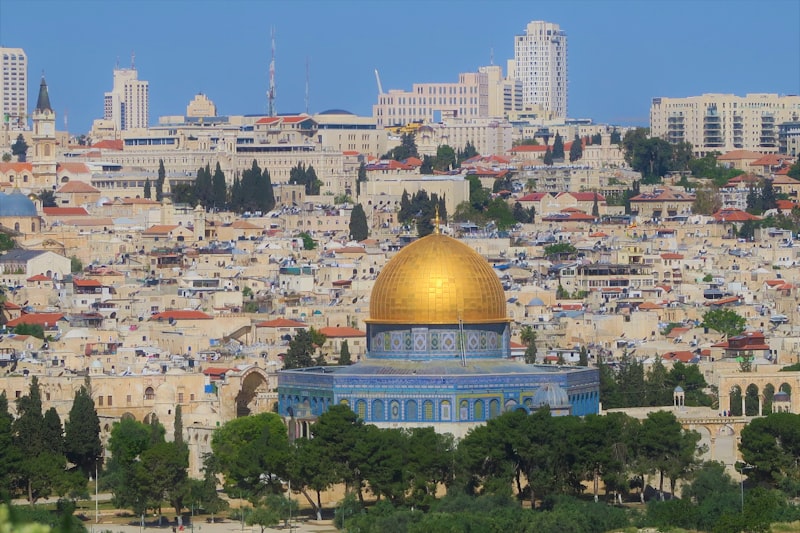The Al-Aqsa Mosque, a place of immense historical and religious significance, is located in the captivating country of Palestine. Situated in the heart of Jerusalem’s Old City, this sacred site holds deep meaning for Muslims worldwide. With its rich heritage and awe-inspiring architecture, the mosque stands as a testament to centuries of devotion and reverence.
Nestled within the larger compound known as Al-Haram Al-Sharif or the Noble Sanctuary, the Al-Aqsa Mosque occupies a prominent position. Its golden dome shines like a beacon, drawing the faithful and curious alike. The compound itself encompasses over 35 acres, making it one of the most expansive religious sites on Earth.
Stepping foot inside the Al-Aqsa Mosque is an experience like no other. Its interior boasts intricate mosaics, elegant arches, and beautifully adorned prayer halls. The atmosphere is imbued with tranquility, inviting visitors to reflect and find solace within its hallowed walls. It is said that the Prophet Muhammad himself ascended to the heavens from this very spot during the Night Journey.
Beyond its spiritual significance, the Al-Aqsa Mosque also holds great historical importance. Constructed in the 7th century, it has witnessed numerous events and conflicts throughout its existence. From crusades to conquests, the mosque has endured the test of time, emerging as a symbol of resilience and unwavering faith.
Visiting the Al-Aqsa Mosque is not only a personal pilgrimage but also an opportunity to explore the vibrant culture and history of Palestine. As you wander through the surrounding streets, you’ll encounter bustling markets, ancient landmarks, and a tapestry of diverse traditions. The experience is akin to traversing a living museum, where every corner unfolds a new chapter in history.
The Al-Aqsa Mosque resides in the breathtaking country of Palestine. This remarkable sanctuary serves as a testament to the enduring power of faith and the rich tapestry of human history. Whether you embark on a spiritual journey or seek to delve deeper into the region’s past, visiting this sacred site will undoubtedly leave an indelible mark upon your heart and soul.
Historic Al-Aqsa Mosque: A Symbol of Faith and Contention in Jerusalem
Introduction:
The historic Al-Aqsa Mosque stands as a remarkable monument, deeply rooted in history, faith, and controversy. Located in the heart of Jerusalem, this sacred site holds immense significance for Muslims around the world. With its rich heritage and turbulent past, the Al-Aqsa Mosque encapsulates a captivating narrative that continues to shape the dynamics of the region.
Unraveling the Historical Significance:
Dating back over 1,300 years, the Al-Aqsa Mosque is one of the oldest Islamic structures. It is believed to be the second holiest site in Islam after the Kaaba in Mecca. According to tradition, the Prophet Muhammad embarked on a miraculous night journey from Mecca to Jerusalem, where he ascended to the heavens. At this sacred spot, the Al-Aqsa Mosque was later constructed, symbolizing the culmination of this spiritual journey.
A Center of Spiritual Worship:
The Al-Aqsa Mosque serves as not only a place of prayer but also a focal point for Muslims worldwide. Muslims gather here during Ramadan for special prayers, fostering a sense of unity and devotion. The serene ambiance within the mosque’s walls evokes a profound sense of spirituality, drawing believers and seekers alike to experience its tranquil atmosphere.

Contention and the Israeli-Palestinian Conflict:
Regrettably, the Al-Aqsa Mosque has been embroiled in countless conflicts throughout history. Its location on the Temple Mount, a site also considered holy in Judaism, has resulted in intense religious and political tensions. The ongoing Israeli-Palestinian conflict often manifests in clashes surrounding access to the mosque, sparking unrest and deepening divisions.
Preservation Efforts and Access:
Recognizing the historical importance of the Al-Aqsa Mosque, various organizations and institutions have taken steps to preserve and protect this iconic landmark. The Islamic Waqf, a religious trust responsible for Islamic holy sites in Jerusalem, oversees the day-to-day operations of the mosque. However, debates over access and control persist, underscoring the complex nature of its management.
Conclusion:
The Al-Aqsa Mosque stands as both a testament to faith and a source of contention in Jerusalem. Its historic significance, spiritual allure, and ongoing conflicts make it a symbol that captures the complexities of this ancient city. As conversations surrounding Jerusalem continue, striking a delicate balance between preservation, access, and mutual respect remains crucial to ensuring the continued importance of this remarkable religious site.
The Al-Aqsa Mosque: A Sacred Site at the Heart of Israeli-Palestinian Conflict
Nestled in the heart of Jerusalem’s Old City lies the Al-Aqsa Mosque, a site of immense significance and fervor for both Muslims and Jews. This sacred place has been at the center of the Israeli-Palestinian conflict, fueling tensions and capturing global attention. Let’s delve into the rich history and contentious status of this revered mosque.
For Muslims, the Al-Aqsa Mosque holds deep religious importance. It is believed to be the third holiest site in Islam after Mecca and Medina. According to Islamic tradition, Prophet Muhammad embarked on a miraculous night journey from Mecca to Al-Aqsa Mosque before ascending to the heavens. The mosque’s golden dome stands as a symbol of spiritual aspiration for millions of Muslims worldwide.
However, the Al-Aqsa Mosque compound, known as Haram Al-Sharif or the Noble Sanctuary, is not just significant to Muslims. For Jews, it is one of the most sacred places as well. Referred to as the Temple Mount, it is believed to be the location of the First and Second Jewish Temples in ancient times. Many Jews yearn for the rebuilding of their holy temple at this very spot.
This clash of religious narratives surrounding the Al-Aqsa Mosque has contributed to the Israeli-Palestinian conflict. Both Israelis and Palestinians claim sovereignty over the area, and control of the compound has been a contentious issue since Israel’s occupation of East Jerusalem in 1967. The political disputes, sporadic outbreaks of violence, and restrictions on access to the mosque have only heightened tensions in an already volatile region.
To add further complexity, the Al-Aqsa Mosque is situated adjacent to the Western Wall, one of Judaism’s holiest sites. This proximity has created a delicate balance that requires careful navigation to maintain peace and respect the rights of all parties involved.
The Al-Aqsa Mosque stands as a sacred site of immense religious significance for Muslims and Jews alike. Its central location in Jerusalem’s Old City has made it a focal point of the Israeli-Palestinian conflict. As tensions continue to simmer, finding a peaceful resolution that acknowledges the aspirations and beliefs of all parties remains a significant challenge. The future of the Al-Aqsa Mosque and its role in the quest for peace in the region will undoubtedly shape the course of history.
Discovering the Al-Aqsa Mosque: A Journey Through Jerusalem’s Rich Heritage
Are you ready to embark on a journey through Jerusalem’s vibrant history? Join me as we discover the hidden treasures of the Al-Aqsa Mosque, a revered symbol of Islamic heritage. Situated in the heart of the Old City, this sacred site holds profound significance for Muslims worldwide.
Step foot inside the Al-Aqsa Mosque, and you’ll be transported to a realm of architectural splendor. The majestic structure showcases intricate designs, soaring domes, and elegant minarets that reach towards the heavens. As you wander through its hallowed halls, you can’t help but marvel at the craftsmanship that has stood the test of time.
But the Al-Aqsa Mosque is not just a feast for the eyes; it’s a place imbued with spiritual energy. Muslims hold this site dear as it is believed to be the location from which Prophet Muhammad ascended to the heavens during the Night Journey. This miraculous event makes the Al-Aqsa Mosque the third holiest site in Islam, following Mecca and Medina.
Walking through the courtyard, you’ll encounter the iconic Dome of the Rock, an architectural gem adorned with vibrant mosaics. This magnificent shrine serves as a constant reminder of Jerusalem’s multicultural heritage, blending elements of Byzantine, Persian, and Islamic traditions.

Beyond its religious significance, the Al-Aqsa Mosque complex also bears witness to the city’s tumultuous past. Over the centuries, numerous conquerors and empires have left their mark on this sacred ground. From the Crusaders to the Ottomans, each era has contributed to the mosque’s rich tapestry of history.
As you explore, take a moment to appreciate the stunning views of the Old City from the mosque’s elevated vantage point. Gaze upon the labyrinthine streets, bustling markets, and ancient walls that have witnessed countless chapters of human civilization.
Controversy Surrounding Al-Aqsa Mosque Ownership: Unraveling the Historical Claims
Introduction:
Have you ever wondered about the ownership of historical landmarks and the controversies that surround them? One such disputed site is the Al-Aqsa Mosque in Jerusalem. In this article, we will dive into the intriguing world of the Al-Aqsa Mosque’s ownership and unravel the historical claims that have sparked intense debates.
Unearthing Ancient Roots:
To understand the controversy, we must travel back in time to the 7th century CE when the Umayyad Caliphate constructed the Al-Aqsa Mosque on the Temple Mount. This location holds immense significance for both Muslims and Jews, as it encompasses not only the mosque but also the Western Wall, a revered Jewish holy site. The overlapping religious and historical connections set the stage for ongoing disputes over ownership.
Islamic Claims:
Muslims consider the Al-Aqsa Mosque the third holiest site in Islam, after Mecca and Medina. They believe that the Prophet Muhammad ascended to heaven from this very spot during the miraculous Night Journey. Consequently, Muslims assert their rightful ownership based on the sanctity bestowed upon the site by Islamic tradition and history.
Jewish Connection:
On the other side of the debate, Jews argue that the Temple Mount, where the Al-Aqsa Mosque stands, is the site of two ancient Jewish temples: Solomon’s Temple and Herod’s Temple. These temples held utmost significance in Jewish religious and cultural heritage. Some Jewish activists contend that the site should be under Jewish ownership, allowing them to rebuild their temple.
Historical Challenges:
The rich historical tapestry of the Al-Aqsa Mosque presents a complex challenge when determining ownership. Throughout history, control over Jerusalem has changed hands multiple times, with various Muslim and non-Muslim powers claiming authority. The Crusaders, Ottomans, and British Mandate each exerted control over the site at different periods, further muddying the waters of ownership.
Current Status:
Currently, the Al-Aqsa Mosque is administered by an Islamic Waqf, a religious endowment organization appointed by Jordan. The Israeli government allows Muslims to worship at the site but restricts Jewish prayer to the Western Wall plaza. This arrangement attempts to strike a delicate balance between the conflicting claims and maintain relative peace.
Conclusion (not included):
The controversy surrounding the ownership of the Al-Aqsa Mosque reflects the deep historical, religious, and political tensions in Jerusalem. Understanding the contrasting claims made by Muslims and Jews reveals the complexities embedded within this issue. As discussions continue, it remains essential to foster dialogue and seek peaceful resolutions that respect the diverse beliefs and values associated with this cherished landmark.